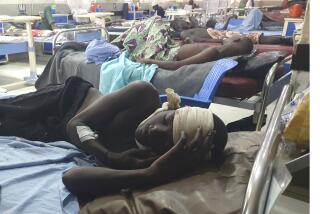At least 18 killed in series of blasts in Indian capital
- Share via
NEW DELHI — Multiple bomb blasts rocked this densely populated city Saturday evening, killing at least 18 people and injuring dozens more in the worst terrorist incident to hit the Indian capital in nearly three years.
The serial explosions struck packed marketplaces and public areas across Delhi, from its older, northern precincts to the newer, affluent south. At least two bombs blew up in Connaught Place, the city’s most famous commercial district: a circular, colonnaded arcade of shops and restaurants erected during the British Raj.
As is routinely the case in such attacks here, Indian authorities immediately cast suspicion on Muslim extremists. A militant outfit known as the Indian Mujahedin sent an e-mail before the attacks to Indian news organizations, warning that India was soon to receive “the message of death.” The assertion could not be verified.
Indian Mujahedin was little known until several months ago, when e-mails from purported spokespersons claimed that the group was behind at least two deadly bombings: one in May in the tourist destination of Jaipur, which killed more than 60 people, and another in July in the city of Ahmedabad in western India, in which dozens of people died.
Saturday’s apparently coordinated attacks, a string of explosions that went off as darkness fell and the streets were crowded, was the worst to hit Delhi since multiple blasts in October 2005. In that incident, more than 50 people were killed on the eve of one of Hinduism’s most important festivals, leading to government declarations that Islamic radicals were attempting to sow religious strife.
Officials link the Indian Mujahedin to a banned Muslim students group. But little concrete proof has tied the student organization to specific attacks, and bombings throughout India in the last year have not ignited any communal violence in this predominantly Hindu nation.
The first explosion bloodied shoppers and passersby in the area known as Karol Bagh, toward the northern part of Delhi. Two blasts shook nearby Connaught Place, and at least one struck a marketplace in an affluent area of south Delhi.
Local news agencies said authorities defused two other bombs. One was reportedly placed near India Gate, an imposing archway commemorating India’s war dead about a mile down the street from the presidential palace.
TV news showed twisted metal frames of bicycles and damaged cars at the blast sites. Bystanders who escaped serious injury were nonetheless covered with blood. Panicked shoppers fled, emptying streets normally teeming with people enjoying themselves on a warm summer evening.
“It’s a very cowardly act of violence,” Arti Mehra, Delhi’s mayor, told reporters not far from the bombing in the southern part of the city. “They want to break the spirit of Delhi. They have tried this in other places before and they have not succeeded, and they will not succeed here.”
India is home to many militant groups, some of them ethnic separatists and others religious radicals. Attacks, particularly bombings, are not uncommon; suspicion often falls on extremists from Kashmir, who want the contested Himalayan region split off from India or merged with Pakistan.
Arrests are usually swift after such incidents. But human rights groups say that evidence is often elusive and that the police sweeps round up innocent people, many of them young Muslim men.
--
More to Read
Sign up for Essential California
The most important California stories and recommendations in your inbox every morning.
You may occasionally receive promotional content from the Los Angeles Times.











